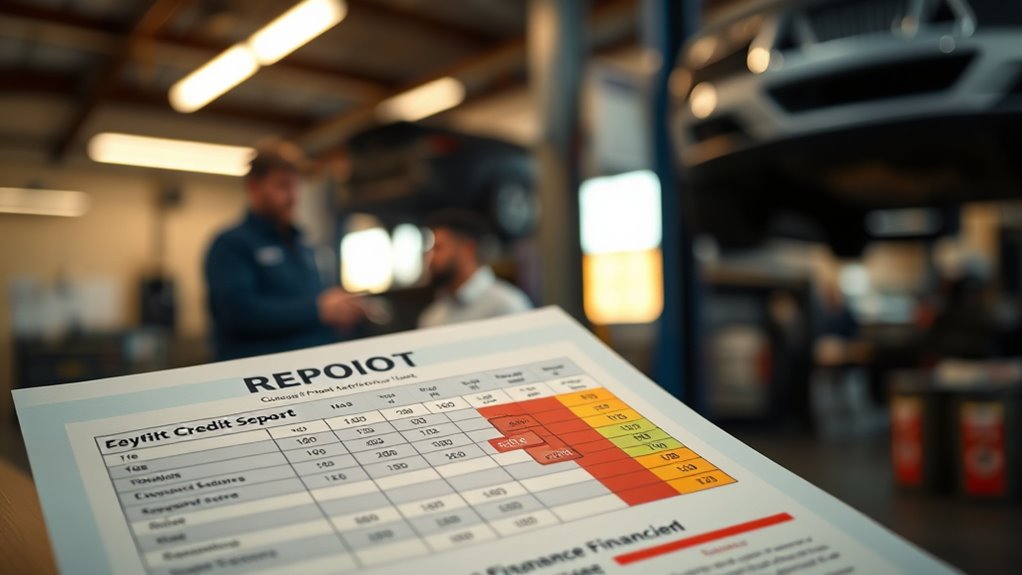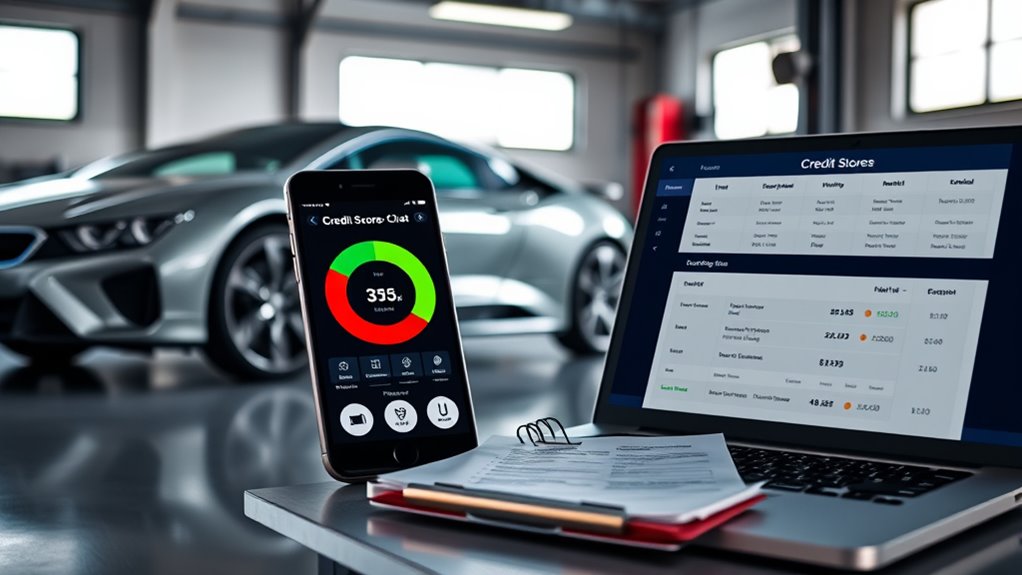Your credit score plays a key role in determining if you qualify for auto repair financing and the options available to you. A high score makes it easier to get approved with favorable interest rates and fewer restrictions, while a low score may lead to higher costs, stricter conditions, or even denial. By understanding how your credit affects these options, you can make smarter choices and improve your chances—continue to learn more about how your credit impacts repair financing.
Key Takeaways
- Higher credit scores improve chances of qualifying for auto repair loans and better financing terms.
- Poor credit scores may lead to stricter conditions, higher interest rates, or denial of financing.
- Good credit scores often eliminate the need for collateral or large down payments.
- Lower credit scores typically result in higher interest rates, increasing overall repair costs.
- Improving credit scores before applying can secure more favorable financing options and savings.

Your credit score can substantially impact your options when it comes to financing car repairs. If you’re considering taking out a loan or using a financing plan, your credit score serves as a key factor in determining whether you qualify and what terms you’ll receive. Lenders look closely at your credit history to assess your reliability in repaying borrowed money. A higher credit score signals to lenders that you’re a low-risk borrower, which can open doors to better financing options. Conversely, a lower score might limit your choices or result in less favorable terms.
A strong credit score improves your chances for better auto repair financing options.
When it comes to auto loan eligibility, your credit score plays a critical role. If your score is excellent or good, you’re more likely to qualify for a traditional auto loan or repair financing with minimal restrictions. Lenders see you as someone who’s responsible with credit, so they’re more inclined to approve your application. On the other hand, if your credit score is poor or fair, you might face higher hurdles. Some lenders may deny your application outright, or they could impose stricter conditions such as requiring a larger down payment or securing the loan with collateral. This can make getting the necessary funds for repairs more challenging.
Your credit score also directly impacts the interest rate impact you’ll encounter. A high score tends to secure you the most competitive interest rates, meaning lower borrowing costs over the life of the loan. This can save you a significant amount of money, especially if the repair costs are substantial. However, if your credit score is lower, expect to pay higher interest rates. Elevated rates increase your overall repayment amount, making repairs more expensive in the long run. It’s important to weigh these factors when considering financing options, as the difference in interest rates can sometimes double or triple your costs.
Understanding how your credit score influences auto loan eligibility and interest rate impact empowers you to make smarter decisions. If your score isn’t ideal, you might want to improve it before applying for a repair loan, or explore alternative financing options like credit unions or store-specific financing. Sometimes, paying for repairs out of pocket or negotiating directly with repair shops can be more economical if your credit isn’t in top shape. But if you need to borrow, knowing how your credit score affects your options helps you set realistic expectations and choose the best route to get your vehicle repaired without unnecessary financial strain.
Frequently Asked Questions
Can I Improve My Credit Score Before Applying for Repair Financing?
Yes, you can improve your credit score before applying for repair financing. Focus on credit improvement by paying bills on time, reducing your debt, and avoiding new credit inquiries. These actions boost your score and increase your chances of qualifying for better financing options. Score boosting takes effort, but the sooner you start, the better your chances of getting favorable terms for your car repairs.
Do All Lenders Require a Minimum Credit Score for Car Repair Loans?
Your chances are like a roller coaster—some lenders have strict rules, while others are more flexible. Not all lenders require a minimum credit score for car repair loans, as their policies vary widely. Some may approve your application regardless of your credit, especially if you have a solid financial history, while others strictly enforce credit score requirements. Always shop around and compare lender policies to find the best fit for your situation.
How Do Credit Scores Impact Interest Rates on Repair Loans?
Your credit score directly impacts interest rate variations on repair loans. If your score is above certain credit score thresholds, you typically qualify for lower interest rates, saving you money. Conversely, if your score falls below those thresholds, expect higher interest rates, which increase your overall costs. Maintaining a good credit score helps you secure more favorable loan terms, making repairs more affordable in the long run.
Are There Alternative Financing Options for Those With Poor Credit?
Imagine standing at a bustling marketplace, searching for a way to fix your car without the usual credit hurdles. You can explore alternative lenders who offer options regardless of your credit score. Some specialize in credit repair loans or small personal loans, giving you a chance to rebuild your credit while funding repairs. Keep in mind, these options might have higher interest rates, but they can get your vehicle back on the road faster.
How Long Does It Take to Rebuild My Credit After a Repair Loan?
Rebuilding your credit after a repair loan typically takes about six months to a year, depending on your credit repair efforts. During this time, consistently making on-time payments, reducing your debt, and monitoring your credit report help improve your score. The loan duration influences how quickly your credit profile strengthens; shorter loans with timely payments often lead to faster positive changes. Stay patient and proactive to see steady credit improvements.
Conclusion
Your credit score can make or break your chances of securing affordable car repair financing. A high score opens doors to better interest rates, while a low score might mean you’re stuck between a rock and a hard place. Remember, it’s not just about the score itself—it’s about how you handle your finances. Don’t let your credit score be the straw that breaks the camel’s back; take control and steer your financial future with confidence.









